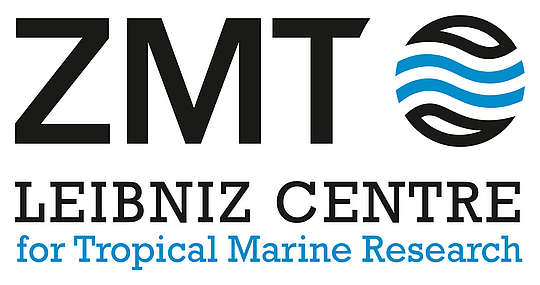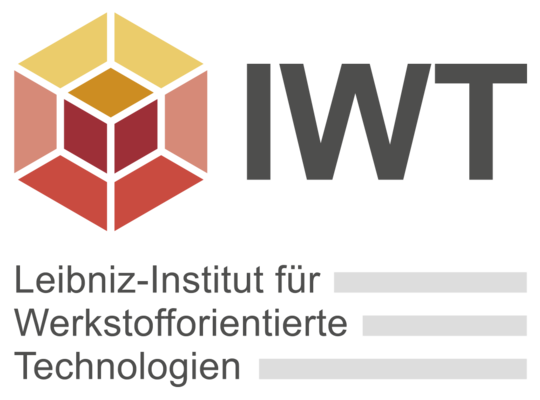Von Rainer Busch
01 Jan 2021
The shelves in room 2.62 of the Institute for Artificial Intelligence (IAI) at the University of Bremen are well stocked. Some hold glass bottles filled with olive oil, granola packages, or washing powder. On other shelves, you can find toothbrushes or cosmetic products. “Donbot,” a waist-high, autonomously moving robot, who is fitted with a laser scanner, 3D camera, sensors, and lightweight construction alarm, stops in front of one shelf. He systematically scans the goods rack. The result can be seen on a large monitor only a few meters away – slowly one can see the shelves and the products appearing.
The replica of a drugstore is the testing area for a project that Professor Michael Beetz is sure is already a great success for Bremen. He believes this as the project, which is funded by the Federal Ministry for Economic Affairs and Energy, has a budget of 12.9 million euros and was amongst the winning 16 projects in a competition with 130 competing ideas. Additionally, it brings together a dozen partners from the scientific and economic sectors, of which more than half are from Bremen.
However, the main reason why he is so convinced is that the project will anchor the state as the innovation leader of a key artificial intelligence (AI) technology on Germany’s AI map. That this is the case is not least because of Michael Beetz himself. Only recently did the Chinese Tsinghua University confirm the IAI Director’s leading role in science across the world. In the university’s international ranking, he placed fourth in the category “Robotics.”
“The system should be able to answer questions.”
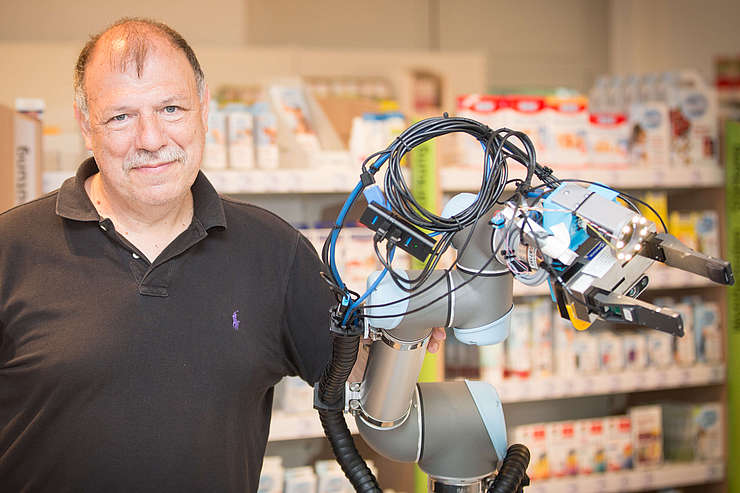
“When you implement a robot in surroundings that it does not know, it autonomously creates a map of said surroundings, and subsequently completes a useful task based on this, it is a big step and one of the main research goals of autonomous robotics,” enthuses Beetz. In “Knowledge4Retail” – K4R in short, it is, however, not only about the useful implementation of automated systems. It deals with the connection of the analogue and digital world, a new form of information systems and shopping, the intelligent connection of data. When asked to describe the basic idea, the scientist states: “We not only want to visualize the world of retail with the quality of a modern computer game. The system should also be able to answer questions.”
Where is the granola that is suited to my diet requirements? Where are the organic products? How much sugar is in the pizza? Does the shampoo contain micro plastic? The customers should be able to find their store on the internet, which is recreated down to each last detail by robots and is connected to product information that is stored in a knowledge database. Via an app, they can then go to their desired product within this digital twin, put the product in their basket, and then pay at the till or shop together with friends using avatars.
“The potential for AI applications in the trade industry is immense,” enthuses Beetz convinced. This especially applies to the retail sector, where stores have hardly been digitalized to date. Shop managers can request information on their store stock and sales data using K4R and make their product range fit the specific demands of their customers. What does the customer buy and when? Why is this product selling well in one store but not in the other? How does product placement influence purchase behavior? K4R enables regional managers to compare individual stores and amend their assortment accordingly.
The black box that is retail is thus transformed into a white box in this way. The stores then have the right products available at the right time in the right place. The stacking of shelves can be completed by robots who take what they need from the store storage area. In turn, the stores only receive store-specific goods, which means that time-consuming unpacking and resorting is not needed.
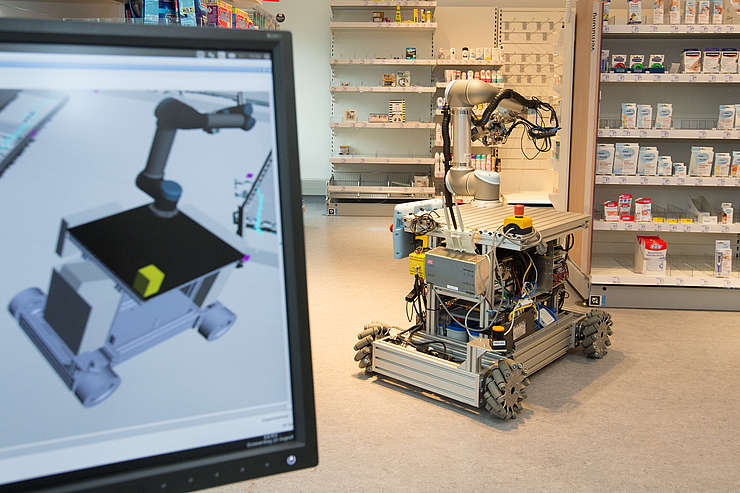
The project, which is initially planned to run for three years, defines four cases of more efficiency and better customer service: Intelligent intralogistics, which includes the stacking of shelves and storage management; optimum store design with a product range that is put together and placed to suit each location; the development of an autonomous service robot that helps staff with shelf stacking; and finally a refrigerator that is capable of recognizing, tracking, managing, and selling its own products.
“With this research project, we are able to recognize many cases of development potential and integrate them into our daily work. That is how we are creating space for our staff on the shop floor to advise customers or implement new services, such as ‘express collection’,” says Roman Melcher, the dm manager who is responsible for the IT department / dmTECH. Europe’s largest drugstore with around 3,700 stories is one of K4R’s cooperation partners. The shelves and products on the second story of the IAI come from dm.
“This cooperation is fantastic for Bremen. Together, we are amongst the absolute leaders in AI-based robotics across the country.”
The project is being led by the Bremen company team neusta GmbH. IAI has taken on the main scientific role within the network and carries the main responsible for the development of the knowledge platform. Another member of the U Bremen Research Alliance also plays a significant role – the German Research Center for Artificial Intelligence (DFKI). “This cooperation is fantastic for Bremen,” believes Michael Beetz. “Together, we are amongst the absolute leaders in AI-based robotics across the country and can hopefully take disruptive steps forwards.”
“They should amaze people and make them think: I’d like one of those too.”
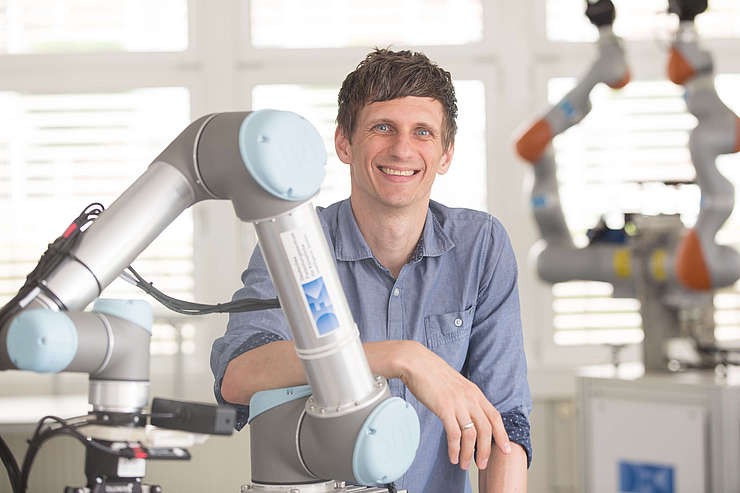
The DFKI will also develop a mobile service robot much like the prototype “Donbot.” However, it will not only create a digital map of a drugstore but will integrate itself in the processes and structures of a store by helping with shelf stacking and transporting of goods. “That is a challenge. Especially if you think about the fact that customers will be walking down the aisles or that there may be obstacles such as shopping baskets in the way,” explains Dennis Mronga, K4R project leader within the DFKI research department Robotics Innovation Center. The robot does not only need to be able to avoid them but also needs to be able to decide which shelf to go to first and what the best way there is. “We want it to behave and react intelligently. For this we will use the information from the software platform that the IAI is developing.”
The knowledge database is a central part of the project. The superordinate aim is to create an open-source platform that is open to all so that everyone, whether customer, salesperson, or researcher, can use the technology. “Pilot and introductory applications will be an extremely important factor for the success of the project,” states Beetz. “They should amaze people and make them think: I’d like one of those too.”
https://knowledge4retail.org/en/home-2/
Collaborative Research Center EASE
Daily household activities, such as setting a table or cooking, are highly complex tasks for robots. Mastering them would open entirely new perspectives in robotics – especially in the context of an ageing society. The Collaborative Research Center EASE (Everyday Activity Science and Engineering) at the Institute for Artificial Intelligence at the University of Bremen, which is funded by the German Research Foundation (DFG), has the aim of enabling robots to comprehensively master these activities, complete them autonomously, and learn whilst doing so. At the same time, under the name of “openEASE” the research and development is being made available as part of a web-based knowledge transfer platform of global robot and activity data. For example, if a robot has learnt a task such as the stacking of a shelf, it can then pass this ability on to others.










